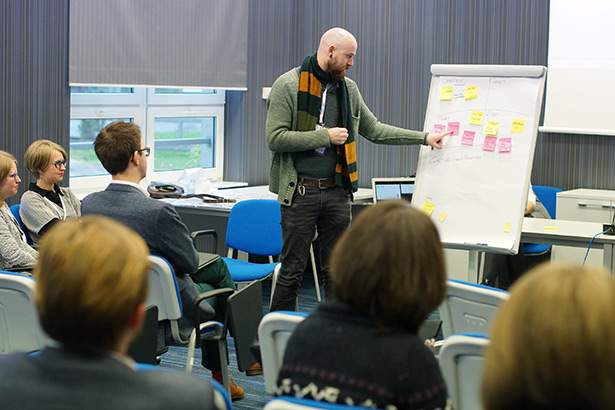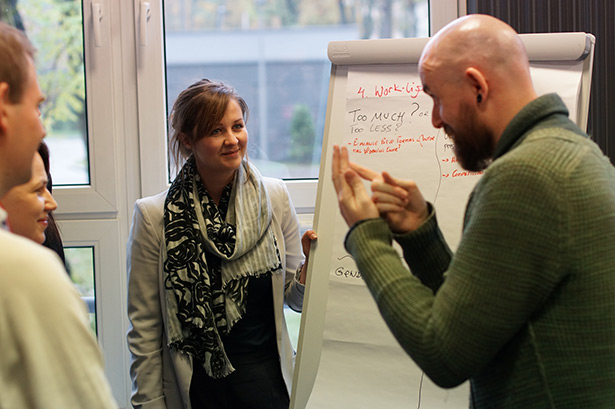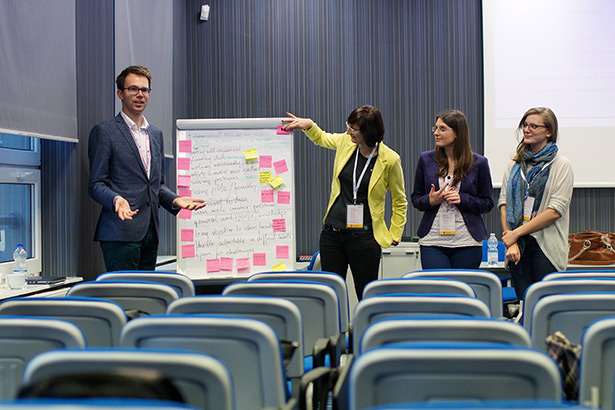European Forum of Young Innovators (EFYI) 2016 Workshop ‘What Future for a PhD Holder?’ by Miia Ijäs and Gareth O’Neill

The first meeting of the European Forum of Young Innovators (EFYI) took place in Łódź, Poland on 24 and 25 October 2016. The event aimed to bring together representatives from the worlds of science and business to discuss key issues affecting young innovators and focused on the theme ‘From Idea by Transfer to Impact’. The conference was split across two days, with the first day involving panel discussions with experts from science and industry, and the second day involving workshops for early-career researchers (ECRs).
Despite the cold and wet weather on the second day of the conference, many courageous ECRs braved the elements to attend the workshops. One of the workshops was given by Miia Ijäs and Gareth O’Neill from Eurodoc on ‘What Future for a PhD Holder?‘. This was in the form of a learning café, where the 25 or so participants were split into four groups and revolved around four different themes. Each group discussed each theme in turn and wrote comments on flip-charts which were left for the next group to reflect upon and develop.

The initial two topics looked at the professional development of a doctoral candidate/junior researcher. The first theme ‘Professional PhDs and their Skills in Future Academia’ was on current developments in academia and the skills ECRs want and need to develop themselves professionally. A whole list of skills was suggested including organisation and planning, problem solving and working under pressure, being polite/friendly and ability to work in/lead a team, being flexible to changing situations and open to new ideas. This supports the European Commission’s focus on better transferable skills courses. Although a lot of focus was given on transferable skills, the conclusing remarks on the topic emphasised that the most important skill for any researcher continues to be his/her expertise in the subject field. One thing was clear: PhDs are professionals and should be treated as such in the form of paid employment!
The second theme ‘Academics at the (Non-)labour Market’ addressed the urgent need to prepare PhDs for life outside academia. (Perhaps surprisingly but showing a topical trend,) most of the participants wanted to work in industry and supported initiatives to help ECRs be entrepreneurs and be involved in start-ups and spin-offs. Paid internships in industry during the doctoral training and junior researcher stage were seen as a useful way to gain valuable experience and network in industry at an early stage. All stressed that Higher Education Institutions (HEIs) should develop paid internship programmes in collaboration with industry to train and support their PhDs/postdocs. This is indeed very necessary seeing as in Europe many ECRs must leave academia due to lack of academic positions and it also supports the European Commission’s focus on better intersectoral mobility.

The final two topics dealt with the social/societal development of a doctoral candidate/junior researcher. The third theme ‘Academics in Society’ focussed especially on the issue on whether ECRs should be involved in Open Science. Most participants felt that their data should be made public, although in some cases the data might need to be anonimised or embargoed. They also agreed that research should be made available in the form of open access publications and that this should be more supported and developed. This is good news for the European Commission’s current push for Open Science. Valorisation using popular media was also seen as a useful and interesting way for ECRs to disseminate their work and to engage society at large. The general consensus was to be open as much as possible to the public.

The final theme ‘Work-life balance’ cut to the core of the happiness of ECRs. An academic career is very demaning, especially in the early stages, and the line between academic and private life often blurs. It is not surprising that recent research has shown that many ECRs suffer from stress, anxiety, and even depression. The participants felt that the pressures on ECRs were indeed very high and that HEIs should take action so that the PhD/postdoc is manageable. Female and parents were seen as particularly vulnerable, and suggestions for improvement involved better gender equality policies and support for families at HEIs. In general, the participants agreed that a better work-life balance could be achieved by also staying active outside academia. Ultimately, it is also down to the ECRs themselves to decide and stand up for themselves. The workshop finished on a simple plea: take control of your own career and future!



















